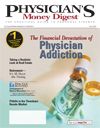Publication
Article
Physician's Money Digest
Retirement-It's All About the Timing
Author(s):
Longer life expectancies and fewer pensions are taking a toll on baby boomer retirement plans and the plans of the generations that will follow. The investment community is promoting platforms designed to prolong financial growth, targeting plans that continue to grow after retirement (ie, distribution) rather than plans which focus on the most gain prior to retirement (ie, accumulation).
Accumulation vs Distribution
In terms of investing, accumulation is significantly easier to deal with than distribution. During the accumulation phase, a 10% market loss would require a return the following year of about 11.1% to break even. However, during the distribution phase, a 10% market loss combined with a 5% withdrawal would require 17.6% to reach breakeven. Needing a 17.6% return while also requiring withdrawals for retirement is not a place most retirees want to find themselves.
We are taught that volatility is the best friend of someone in the accumulation phase of life. Volatility creates uncertainty, which produces opportunity. When the market drops during the accumulation phase, an investor is offered the chance to buy at a lower price. When the market increases, volatility offers the opportunity for higher returns. What isn't well known is the extent to which volatility is the enemy of a retiree in the distribution phase. Physicians, therefore, should plan for market ups and downs when investing in a postretirement strategy.
Market in Which You Retire
The state of the market at the time of retirement can have a significant impact. Retiring at the beginning of a bull market can work wonders for a portfolio because the account value will be rising at the same time withdrawals are being made. If the market is rising fast enough and withdrawals are reasonable, then the value of the portfolio can still rise. However, retiring at the beginning of a bear market could prove disastrous. If the market immediately drops and withdrawals are necessary—and in a retirement without a pension there would be few other options—then the account value could fall significantly and potentially never recover. Even if the market recovers a couple of years later, all of the withdrawals that had been taken will no longer be invested and will not be able to enjoy the recovery.
Physicians have long known that they need to plan for their own retirement. What they need to add to that plan is a strategy which keeps timing in mind. Physicians need to understand how variables that an investor has no control over, like the timing of a bull or bear market, can dramatically impact an otherwise well-planned retirement.
The Bottom Line
- The accumulation phase of a retirement savings plan is more conducive to taking investment risks to achieve growth.
- The state of the market should be taken into account when determining a date to begin retirement.
Greg Reed is the director of planning for Smith, Frank & Partners, LLC and coauthor of Countdown. He is a registered representative of and offers securities and advisory services through NFP Securities, Inc, member.
